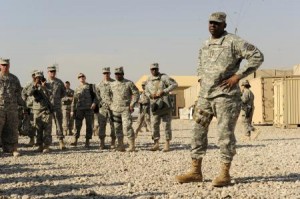Special to WorldTribune.com
BAGHDAD — The U.S. military is projecting that Al Qaida will gain
strength in 2012.
The U.S. commander in Iraq said that Al Qaida was expected to
benefit from the American troop withdrawal by the end of the year. Gen.
Lloyd Austin said the absence of U.S. combat troops would bolster Al Qaida
in Iraq and expand operations, particularly in the north. AQI was believed
to have about 500 fighters in the country.

“We expect that it’s possible that they could even increase in their capability [in the north],” Austin said.
In a briefing on Nov. 21, the general relayed what officials termed a pessimistic assessment by the U.S. military in 2012. They said the military assessment envisioned a sharp increase in operations by Al Qaida as well as Iran’s Islamic Revolutionary Guard Corps, which controls several Shi’ite militias in central and southern Iraq.
“When you look at the environment in the south, we’ve seen activity over the last several months that are from the Iranian-backed militants,” Austin said. “We expect that that type of activity could possibly continue into the future.”
The U.S. military presence in Iraq has dwindled to fewer than 20,000 troops amid an intensified withdrawal expected to be completed over the next month. Austin said the Iraqi military and security forces have taken over responsibility from the United States.
“We really intend to remain engaged with Iraq,” Austin said. “There’s
likely to be some setbacks, some tough days ahead, but I am very hopeful
that we’ll stay on course.”
Austin said the insurgency level in Iraq would depend on the
performance of the army and security forces. The general warned that
Iranian-sponsored Shi’ite groups have sought to form a Hizbullah-type
autonomous enclave similar to that in Lebanon.
“The Iraqi government has to treat [Shi’ite militias] based upon what
they really are,” Austin said. “And again, these are elements that are
really focused on creating a Lebanese Hizbullah kind of organization in this
country, a government within a government. And those elements would have
their own militia. If these elements are left unchecked, they will then
eventually turn on the government.”
Washington has failed to reach agreement with Baghdad over a U.S.
military trainer presence in Iraq in 2012. Officials said the key obstacle
was Iraq’s refusal to provide immunity from prosecution for U.S. military
personnel.
“If I were them, I would ask for help because we are the best in the
world,” Austin said.

You must be logged in to post a comment Login